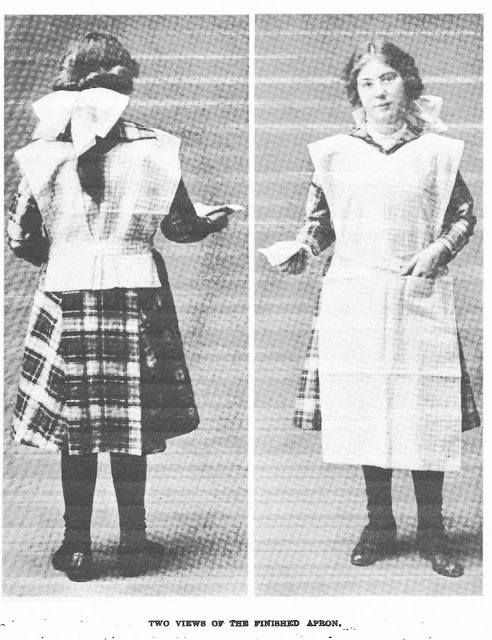My mom and I have been talking about aprons.
Mom: "Do you know who never wore aprons?"
"Of course," I respond. "Nana Elsie (my Dad's mom). I never saw her wear an apron--and then again, I never saw her wear slacks either."
Mom's mom, Nana Betty, always wore an apron--always a half one. It served a variety of purposes: tea towel, hot pad, and rubbing something that suddenly needed cleaning. Great Grandma always wore this big apron that resembled a dress--similar to this:
My mother always wears an apron in the kitchen. I'm not a big apron wearer especially because I don't do much baking anymore.
Do you wear aprons? Do you have fond memories of family members wearing aprons?
Mom and I were talking about this because every now and then, in an old magazine or newspaper, I will find a reference to a specific type of apron that befuddles me. Last week the reference was "the fudge apron" in an early 20th century newspaper. 😕😕😕 Did one need a special apron to make fudge?
So after studying newspapers and magazines, here's my theory and it applies to specialized aprons. There are very few types of aprons sold or featured in articles in the 19th century that included a purpose for the apron. Most of the ads and articles instead focus on the fabric used to make the apron like gingham aprons, linen aprons, cambric aprons. It seems like towards the end of the century more and more articles featured aprons that were embellished with doo-dads:
1893
But in the 20th century, it seemed like there as an apron allotted and sold for every purpose. In 1917, "a bathing apron" was discussed: "A pretty gift for a the mother of a small baby is a bathing apron made from a Turkish towel." An earlier article (1903) suggested the bathing apron be made of flannel.
The mysterious "fudge apron" was probably named after the confectionary. Fudge became popular during the late 19th century (at colleges of all places). By the 20th century, so many fudge recipes had been printed in newspapers, that some readers complained or even made fun of the fudge makers:
I honestly don't know what's funnier to me...the fudge controversy or that the writer signed herself as Lady Macbeth.
😂😂😂
One fudge apron pattern from Royal Society, no date known:
Perhaps more intriguing is this pattern from a 1915 children's magazine:
Most of the articles and ads I found were selling "stamped fudge aprons" for women to embroider.
This of course begs the question, why do all that embroidery for the apron to just get dirty? Apron lovers will think I'm a heretic for that question.
Have a safe and happy day!







My mom always wears aprons, especially when she was a teacher in school, the pockets were her reason. My great grandmother always wore aprons the kind that went over the head that almost reminded me of a dress. I wear an apron when I cook, I always seem to get popped with grease, so it saves my clothes, and of course I wear one at work all the time.
ReplyDeleteI don't wear one, though I probably should. I used to, especially back when family came here for holiday dinners. Reading that pattern, it seems another meaning for "fudge" is appropriate. There's plenty of room for fudging your cutting and sewing to make that apron.
ReplyDeleteOne of my grandmas always wore an apron. At holiday meals we'd have to tell her to take it off before we ate! (She also would forget to take out her pin curls, and that's how I remember her.) She was quite the baker too. When I was first learning to sew my mom would have me make aprons for the women in the family.
ReplyDeleteI wear a bib apron when browning meat at the stove. Otherwise, rarely. Though I should probably wear one when drinking red wine ...
ReplyDeleteLike Libby, I only wear a bib apron when I'm making something sputtery. My mother wore a tie-at-the-waist (not bib) apron when she made dinner. For a while I had a bin full of vintage aprons. I sold nearly all of them at a garage sale a couple of years ago. I tied a rope between two ladders and pinned them up. Many customers made admiring comments on the inadvertent nostalgia display (and they bought 'em).
ReplyDelete